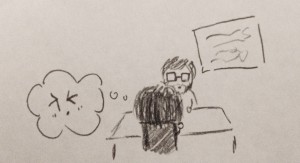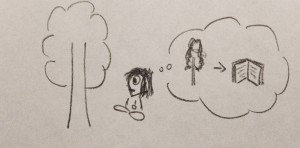A few weeks ago I featured
an interview I did with one of my English professors.
I wanted to continue my bravery, but was also genuinely curious about other teaching styles in other disciplines at the University.
So I asked my friends for teaching recommendations and found myself in the office of Professor Bryan Karney, the Associate Dean of the Faculty of Applied Science and Engineering.
 maintaining a calm and professional facade whilst inwardly sweating.
maintaining a calm and professional facade whilst inwardly sweating.
When asked how he decides what content to cover from year to year, he mentioned four factors he always takes into consideration:
- The students are constantly changing
- The Professor (himself) is constantly changing
- The field of application is changing
- The understanding of educational processes keeps changing.
I found this to be an extremely useful insight for myself as a student. If I were to look at my learning from these different angles, I would probably recognize more connections between what I study, how I study, who I study and why I study.
As a Professor, Karney situates learning within the context of student-teacher relationships and how both sides are connected to ever-changing social environments beyond the class. He therefore adjusts his courses as each year changes. As students, if we situate our learning similarly, there would be a much stronger relevance between class content and our social engagements outside the classroom.
 this tree is relevant to my course because my textbooks come from it.
this tree is relevant to my course because my textbooks come from it.
He stressed in particular that technological evolution makes it impossible to always teach using the latest technology, instead he was more interested in fostering the habit of life long learning. In this way, students would be equipped to learn and handle technology on their own initiatives.

Fostering life long learning means critical thinking skills, as ownership and engagement with the material is what generates real change, and what really rewards students. Karney explained that the upper year seminar classes he teaches demand a stronger sense of student accountability for their own thinking for this reason.
When I asked how students could perform better in his courses, he reiterated what he’d been saying all along
: develop the capacity to read and process material, engage with and understand its implications, take initiative and be responsible for it.
I enjoyed this phrasing, because it reveals how a Professor’s specialization informs his approach to education.
In my earlier interview with Prof. Warley, he explained education through terminology he was comfortable with – the idea of pursuing truth and understanding critical thinking as a form of close reading. Prof. Karney on the other hand, talked about data, materials and concepts; he also stressed mastering principles as a necessary foundation for creative initiatives. As an Engineer, these terms framed the teaching and learning process for him.
My favourite answer in the interview came unexpectedly by asking how he evaluated his own courses.
He answered:
body language, eye contact, amount of texting, noise level, type of questions, and attendance. He also revealed that if students performed poorly on exams, it meant they hadn’t picked up on the material and he’d rethink the course.

Interviewing Prof. Karney showed me teaching that comes from a deeper engagement with environment whether it be the physical space of the classroom, or the social space of his field. This is very much a part of what he is trying to teach and model for his students.
That is life long learning I’d like to take with me too.
 maintaining a calm and professional facade whilst inwardly sweating.
maintaining a calm and professional facade whilst inwardly sweating. this tree is relevant to my course because my textbooks come from it.
this tree is relevant to my course because my textbooks come from it.

0 comments on “The Bravery Continues Interview: Professor Karney”